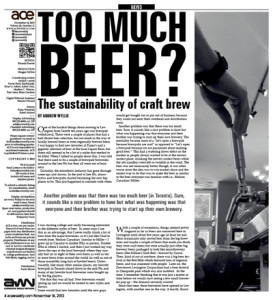Too Much Beer?
The sustainability of craft brew
BY ANDREW WYLLIE
 One of the hardest things about moving to Lexington from Seattle ten years ago was brewpub withdrawal. There were a couple of places that had a half decent beer selection, but not much in the way of locally brewed beers or even regionally brewed beers. I was happy to find new favorites at Pazzo’s and a gigantic selection of beer at the local Liquor Barn, but there still seemed to be a bit of a niche that needed to be filled. When I talked to people about this, I was told that there used to be a couple of brewpub/breweries around in the late 90s but they all went out of business.
One of the hardest things about moving to Lexington from Seattle ten years ago was brewpub withdrawal. There were a couple of places that had a half decent beer selection, but not much in the way of locally brewed beers or even regionally brewed beers. I was happy to find new favorites at Pazzo’s and a gigantic selection of beer at the local Liquor Barn, but there still seemed to be a bit of a niche that needed to be filled. When I talked to people about this, I was told that there used to be a couple of brewpub/breweries around in the late 90s but they all went out of business.
Certainly, the micorbrew industry has gone through some ups and downs. In the mid to late 80s, microbrews and brewpubs started becoming the new hip places to be. This just happened to coincide with when I was starting college and really becoming interested in the different styles of beer. In some ways I see this as an advantage, that I never really drank a lot of beer from the major breweries, so it’s not like I had to switch from ‘Molson Canadian’ (similar to Miller – I grew up in Canada) to double IPAs or porters. Double IPAs is where I started, and then I just worked my way down the taps at the local brewpub where they usually had six or eight of their own beers as well as ten or more beers from around the world (as well as one of those incredibly long lists of bottled beers). Unfortunately, like many other similar places, my favorite brewpub in Toronto closed down in the mid 90s and many of my favorite local breweries were bought up by the big players.
Not that this was all bad. New breweries would spring up and we would be treated to new styles and flavors.
Some would find new favorites until the new guys would get bought out or put out of business because they could not meet their overhead and distribution costs.
Another problem was that there was too much beer. Sure, it sounds like a nice problem to have but what was happening was that everyone and their brother was trying to start up their own brewery. The mentality became more of a “let’s open a brewpub because brewpubs are cool” as opposed to “Let’s open a brewpub because we are passionate about making good beer.”
This had a watering down effect on the market as people always wanted to be at the newest coolest place, drinking the newest coolest beers while the old standbys were left to twiddle in the wind. The beer was not necessarily better though, it was often worse since the idea was to win market share and the easiest way to do that was to make the beer as similar to the beer everyone was familiar with i.e., Molson Canadian/Miller.
Since that time, three breweries have opened in Lexington, with another one on the way. A fourth, Rooster Crow will be opening soon nearby in Paris. There are also a couple of bars that only sell beer. The servers are required to have quite a bit of knowledge about the beers they serve in order to help customers find something they will like. All of these places are great if you really enjoy beer and know what you want or if you don’t drink much beer and want to try something new. New beer drinkers, or people unfamiliar with anything other than the big brewery beer are often surprised by beers that taste like chocolate, or fruits (cherry, raspberry) or even just a good well made pale ale which has a lot of flavor compared to what they may have had in the past
So the question now is whether the craft brewery market segment is sustainable. It’s a complex industry as the products being produced by various breweries are not directly comparable. You can’t compare two breweries to see how successful they will be simply based on how much they produce, it’s really about the quality and variety of the beers being produced and a ton of other factors. What is happening though is that beer consumers in the U.S. are becoming more educated about different types of beers. This should help sustain a demand for craft beers brewed both locally and from around the world.In the meantime, get out to the various breweries and bars around the city and try something new. Look for me, I’ll be out there doing my “research” and would love to hear about what you think of our local beer scene.
Lexington Breweries:
Chase Taproom/Brewery (Taproom open, brewery coming soon)
Rooster Brew (Paris, coming soon)
Country Boy Brewing
Blue Stallion Brewing Company
West Sixth Brewing Company
Lexington Beer Bars (only serve beer):
The Beer Trappe
Lexington Beerworks








